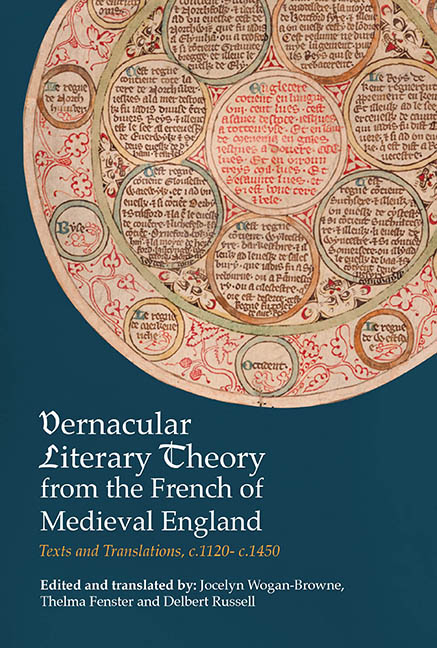 Vernacular Literary Theory from the French of Medieval England
Vernacular Literary Theory from the French of Medieval England Book contents
- Frontmatter
- Dedication
- Contents
- List of Maps and Illustrations
- Preface
- Abbreviations
- Map
- General Introduction
- Establishment of Texts and Translations and Conventions Used
- Part I Faus franceis and dreit engleis: On Language
- Part II Si sa dame ne li aidast: Authorship and the Patron
- Part III Primes dirrum la dreyte fei: The Conduct of Reading, Hearing and Seeing
- Part IV Ki veult oïr: Forming Audiences and Creating Textual Communities
- Part V Si come en latyn trovay escrit: The Lineage of the Text
- Postlude. Honneurs publiées … en divers royaumes
- Part VI Essays and Resources
- Part VI 1. Two Essays
- Part VI 2. Middle English Versions of French Entries
- Part VI 3. Lists of Alternative Arrangements of the Entries
- Timeline
- Glossary
- Bibliography
- General Index
- Index of Manuscripts
Part VI - 1. Two Essays
from Part VI - Essays and Resources
Published online by Cambridge University Press: 25 October 2017
- Frontmatter
- Dedication
- Contents
- List of Maps and Illustrations
- Preface
- Abbreviations
- Map
- General Introduction
- Establishment of Texts and Translations and Conventions Used
- Part I Faus franceis and dreit engleis: On Language
- Part II Si sa dame ne li aidast: Authorship and the Patron
- Part III Primes dirrum la dreyte fei: The Conduct of Reading, Hearing and Seeing
- Part IV Ki veult oïr: Forming Audiences and Creating Textual Communities
- Part V Si come en latyn trovay escrit: The Lineage of the Text
- Postlude. Honneurs publiées … en divers royaumes
- Part VI Essays and Resources
- Part VI 1. Two Essays
- Part VI 2. Middle English Versions of French Entries
- Part VI 3. Lists of Alternative Arrangements of the Entries
- Timeline
- Glossary
- Bibliography
- General Index
- Index of Manuscripts
Summary
England and French
When, in the second eleventh-century conquest of England, William, duke of Normandy, led a coalition of Normans, Bretons, Flemings and other French speakers in the 1066 invasion, there was no question of his imposing a written French-language bureaucracy. The English court already included French among its languages, exchanges between clerics in England and in francophone areas of Europe had a long history and French-speaking landholders were present in England before the Norman Conquest. But William retained the governance of the country by shires and hundreds and his initial writs were sent out in English drafted by the staff of the king's chapel, with greetings to all the king's people ‘frencisce englisce’ (sometimes also ‘englisce ge denisce’). In so far as William used a standard or ‘official’ language for establishing his rule, it rapidly became Latin: as Richard Sharpe argues, the most practical arrangement (in line with continental practice) was to have written Latin documents from which English and French (and Cornish, Irish, Welsh, and Gaelic, or, in continental domains, Norman, Breton and Flemish) translations could be given to differing groups of laypeople involved in government. Certainly, spoken French quickly consolidated its elite status after the Conquest from being one among several languages used in the eleventh-century Anglo-Danish and Anglo-Saxon courts to being the vernacular of England's rulers. But French had as yet no full existence as a written language (some isolated texts from the ninth to the eleventh century survive, but they are specific to particular, usually para-liturgical or other ritual occasions, rather than part of a systematic use of French as a written language of secular culture or record). In England the invaders encountered a different distribution of written and spoken language as between Latin and the vernaculars than in their home culture. Late Old English standardised West Saxon functioned much more like Latin, in that it was a written language used across historiography, law, biblical translation, pastoral care, science, learning, medicine, travel and romance.
- Type
- Chapter
- Information
- Vernacular Literary Theory from the French of Medieval EnglandTexts and Translations, c.1120- c.1450, pp. 401 - 430Publisher: Boydell & BrewerPrint publication year: 2016


